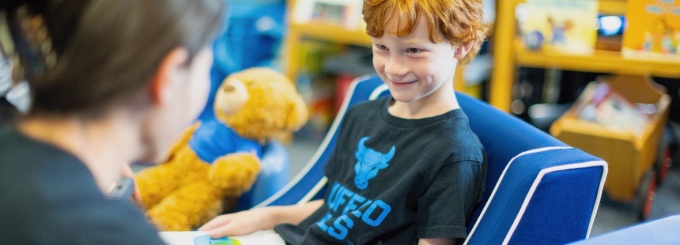Advanced Certificate in Developmental Science

Graduate student working with a child participant in Dr. Jamie Ostrov's lab
Deepen your understanding of development across the lifespan
The Advanced Certificate in Developmental Science at the University at Buffalo gives psychology graduate students the opportunity to study developmental theory, research methods and real-world applications. This program enhances formal training by providing advanced knowledge and hands-on experience in developmental research and practice.
Students who complete the certificate are prepared to contribute to knowledge generation and knowledge transfer within the growing field of developmental science.
UB’s Advanced Certificate in Developmental Science is designed for psychology graduate students who want to explore change and growth across the lifespan. Developmental scientists address questions that impact children, families, educators, health providers and policymakers—examining topics like aggression, substance use, language development and aging.
Through mentorship, applied research and collaboration with experts across UB, students develop a deep understanding of developmental theory and scientific methods. The program complements UB’s doctoral and MA degrees in psychology, providing specialized training in areas such as developmental psychology, developmental psychopathology, applied developmental science and lifespan development using both human and non-human animal models.
- Credential type: Advanced Certificate
- Field: Developmental Science
- Eligibility: Open to current UB Psychology MA or PhD students
- Average time to completion: Typically completed alongside the MA or PhD program
UB’s program combines coursework, mentorship and independent research to strengthen students’ understanding of developmental theory and practice. The structure emphasizes flexible learning, interdisciplinary connections and faculty-guided research experiences.
Program highlights:
- Interdisciplinary approach: Explore research across psychology, neuroscience, education and health sciences
- Flexible coursework: Customize electives to match your developmental interests and research goals
- Mentored research: Complete a developmentally informed paper, review article or lab-based project under UB faculty guidance
- Graduate-level credential: Strengthen expertise while earning an additional qualification alongside your degree
Students complete courses in developmental theory, research design and statistical methods, along with a mentored project or paper focused on developmental science.
Students graduate with a strong understanding of developmental theory, scientific methods and research application. You will:
- Integrate knowledge across developmental theories, methods and empirical findings
- Compare and contrast research approaches within developmental psychology and related fields
- Critically evaluate developmental research design and data analysis, including longitudinal methods
- Communicate developmental research effectively in written and oral formats
- Apply developmental science to real-world challenges in education, health and policy
The program’s mentorship model emphasizes active involvement in developmental research and collaboration with UB faculty across disciplines. Students join developmentally focused labs to gain experience designing, conducting and interpreting research.
UB’s developmental science community includes faculty from Psychology, Pediatrics, Communicative Disorders and Sciences, Learning and Instruction, Counseling and School Psychology, Nursing, Public Health and the Alberti Center for Bullying Abuse Prevention.
This multidisciplinary approach allows students to connect theory with practice and contribute to meaningful, cross-field research on human development.
- Active lab involvement: Conduct research in faculty-led labs focused on child development, adolescence, lifespan psychology and animal models of developmental processes
- Collaborative research network: Engage with experts across UB’s schools of Education, Public Health, Nursing and Medicine
- Applied learning: Complete a developmentally informed research project or paper that bridges theory and practice
- Developmental Science Research Consortium: Attend colloquia, brown bags and our annual research day for interdisciplinary engagement and professional development
Earning UB’s Advanced Certificate in Developmental Science strengthens your qualifications for research, academic and applied roles focused on development.
Common career paths include:
- Developmental or behavioral research assistant
- Program evaluator or data analyst in education or healthcare
- Policy researcher or child development advocate
- Academic or lab coordinator supporting developmental research
- Preparation for doctoral or postdoctoral work in psychology or related fields
Graduates are equipped to translate developmental science into meaningful contributions across education, policy, health and research settings.
Ready to advance your study of psychology?
For more information, please reach out to us!
